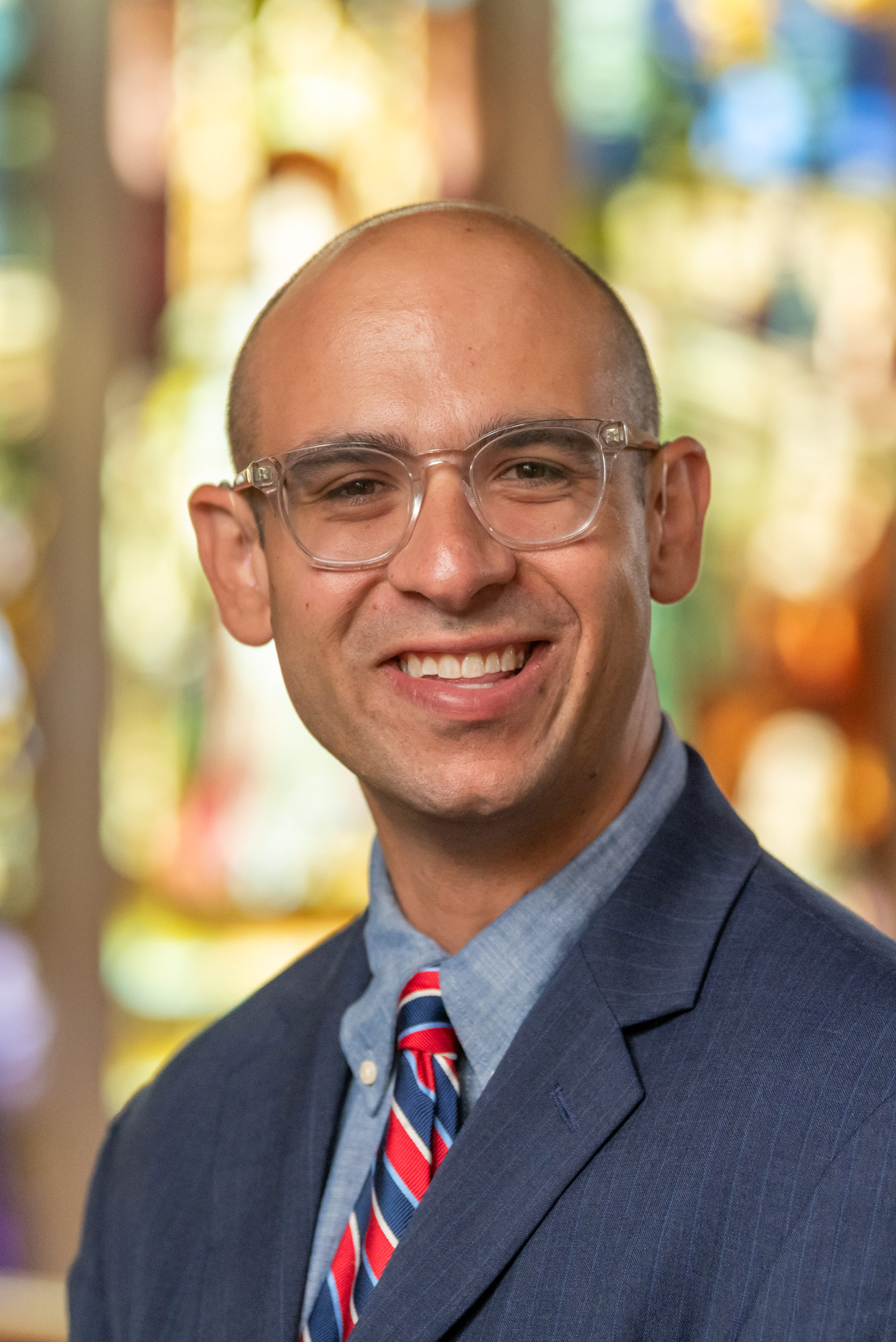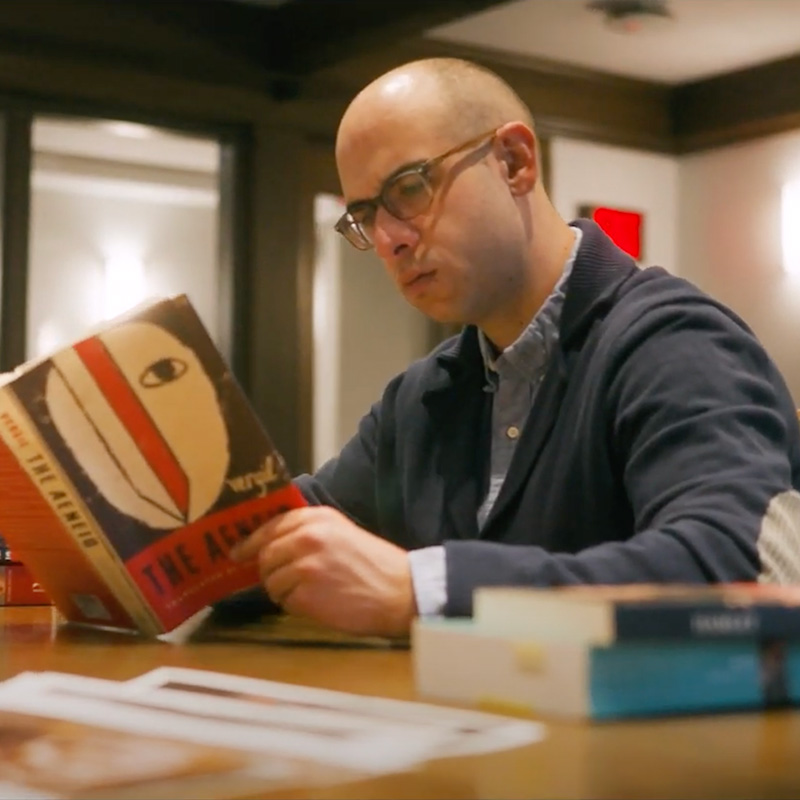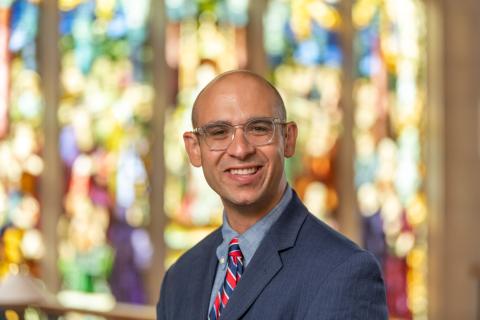Pasquale Toscano

Pasquale Toscano is a scholar/critic, teacher, and writer who specializes in disability, classical reception, and early modern English literature—especially Milton. His scholarship, and creative nonfiction, has appeared or is forthcoming in various publications—including Disability Studies Quarterly, SEL: Studies in English Literature 1500-1900, Shakespeare’s Madnesses, and The Oxford Handbook of George Herbert—while his public-facing essays can be found in venues such as The New York Times, The Atlantic, Electric Literature, and Synapsis: A Health Humanities Journal, for which he’s a contributing writer. Pasquale is currently at work on his first academic book project, Stand and Wait: Dynamics of Physical Dis/ability in the Greco-Roman Epic Tradition. It tells a new story about an old form by revealing how othered embodiment has shaped a genre where it hardly seems to matter at all, with surprising implications for understanding access and accommodation today. Meanwhile, he’s co-editing (with Angelica Duran) the first volume of essays on the intersection of Milton and corporeal difference, Milton and the Network of Disability, Embodiment, and Care (Edinburgh UP). His recognitions include a 2017 Rhodes Scholarship, which funded his master’s degree in Classics; the 2022 Harold Grimm Prize (from the Sixteenth Century Society, with Genelle Gertz), for the year’s best English-language article on the Reformation; and the 2023-2024 Porter Ogden Jacobus Fellowship in the humanities, Princeton’s top honor for graduate students. He’s thrilled to be teaching at Vassar and to work with students interested in literary studies or any of the topics listed above. Informed by his experiences as a proudly disabled person and former educator of incarcerated students, Pasquale’s teaching strives to center accessibility in every sense of the word.
Pasquale Toscano is scholar/critic, teacher, and writer, especially on disability, whose public-facing work has appeared in The New York Times, The Atlantic, Electric Literature, and Vox, among other publications. A graduate of Washington and Lee University (2016), he earned two master’s degrees, in English (1550-1700) and Classics, from the University of Oxford as a Rhodes Scholar, before completing his Ph.D. in English at Princeton University. His research interests include early modern English literature, Milton, disability studies, the Greco-Roman epic tradition, classical reception/Black classicism, and Tudor/Stuart drama (especially Roman plays and Shakespearean tragedy). Though he writes about it less frequently, he’s likewise a fan of contemporary fiction, including Marilynne Robinson’s and Elizabeth Strout’s, as well as musical theater. His scholarship, and creative nonfiction, has either been published or is forthcoming in Disability Studies Quarterly, Reformation, the Classical Receptions Journal, SEL: Studies in English Literature 1500-1900, The Oxford Handbook of George Herbert, and Shakespeare’s Madnesses, while many of his public-facing essays can be found in Synapsis: A Health Humanities Journal, for which he’s a contributing writer. He was a 2023-2024 Porter Ogden Jacobus Fellow, Princeton’s highest honor for graduate students.
Pasquale is currently working on several book projects. His top priority—Stand and Wait: Dynamics of Physical Dis/ability in the Greco-Roman Epic Tradition—explores how nonnormative embodiment serves as both a problem to be solved and a spur to generic innovation in (neo)classical heroic verse. It begins by adducing several thematic and formal reasons for why epic poets often introduce disabled characters only to banish them soon afterward. Four central chapters then discuss writers—Ovid, Spenser, Milton, and Phillis Wheatley Peters—whose relationship to the epic tradition has often been contested. Pasquale argues that their contributions come into clearer focus if we consider them as “crip renovations”: narratives that incorporate, and even are shaped by, a broader range of somatic experiences than is typical for the genre, on the interrelated levels of form, temporality, and heroism. These poems thus become more accessible at least to certain kinds of othered bodyminds. Stand and Wait exposes the limits and allure of heroism; rescripts the rise, fall, and surprising staying power of epic; and shows what this ancient genre has to teach us about accessibility and accommodation today. Pasquale’s second book project—All Pity Choked: The Falls of Tragedy and the Rise of Renaissance Cure—reveals how early modern tragic literature becomes a site for litigating the ethics, affects, and efficacy of “cure,” which gained conceptual currency in the Renaissance. Meanwhile, he’s co-editing the first volume to bring Milton and disability studies into one another’s orbits (Milton and the Network of Disability, Embodiment, and Care, under contract with Edinburgh UP) and writing essays of hybridized creative nonfiction and literary criticism (most recently, for Electric Literature), which he aims to revise into a book.
Teaching is likewise important to Pasquale. He designed a course, “Literature and Psychology,” for Oxbridge Academic Programs in 2018, served as an assistant-in-instruction at Princeton, co-taught introductory composition as part of the Prison Teaching Initiative, and in the fall of 2023, designed and taught a new course called “Bodies and Belonging in Milton’s Epic Tradition” with Nigel Smith. In 2024, the Princeton Graduate School acknowledged his contributions with one of its annual Teaching Awards. At Vassar, his courses include “Succession, From Tudor England to HBO,” “Shakespeare, Our Collaborator,” “Devious Bodies and Dangerous Minds: Health, Medicine, and Disability in Early Modern English Literature,” and “Taking Books Personally.” Outside the classroom, he serves as a frequent mentor for fellowship applicants. Pasquale’s teaching and advising strives to center accessibility in every sense of the word.
Research and Academic Interests
Early modern/Renaissance literature
Milton
Epic
Classical reception/Black classicism
Drama (especially tragedy and Roman plays)
Creative nonfiction
Disability studies
Medical humanities
Departments and Programs
Courses
ENG 101 - Succession, from Tudor England to HBO
ENG 101 - Taking Books Personally
ENG 222 - Early British Literature, From Heroes to the Self(?)
ENG 240 - Shakespeare, Our Collaborator
ENG 341 - Deviant Bodies and Dangerous Minds: Health, Medicine, and Disability in Renaissance Literature
Selected Publications
Articles
“Pity, Singular Disability, and the Makings of Shakespearean Tragedy in Julius Caesar,” SEL 61.2 (Spring 2021): 203-40.
“The Way History Lands on a Face: Disability, Indigeneity, and Embodied Violence in Tommy Orange’s There There,” with Brandi Bushman, DSQ 41.4 (2021).
“Epic Regained: Phillis Wheatley’s Admonitory Poetics in the ‘Little Columbiad,” Classical Receptions Journal 13.2 (April 2021): 178-211.
Essays
“The Head of a Dog or Horn of a Rhino: Milton, Meaning, and Me,” Synapsis, 15 July 2022.
“Hamilton is America’s Monumental Epic. That’s a Good Thing,” LARB, 19 July 2020.
“I’m obese and disabled. I want a healthy lifestyle. But it’s often inaccessible to disabled people like me,” Vox, 27 May 2019.
Op-eds
“Legal Abortion Isn’t the Problem to be Solved,” with Alexis Doyle, The Atlantic, 19 July 2019.
“Stop Using Disability as a Political Club,” The Boston Globe, 4 Feb. 2018.
“My University is Named for Robert E. Lee. What now?,” The New York Times, 22 Aug. 2017.
In the Media
Photos
Download images for non-commercial use, photo credit required.

